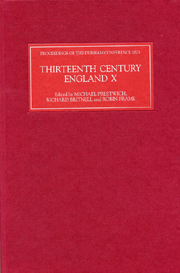Book contents
- Frontmatter
- Contents
- PREFACE
- ABBREVIATIONS
- The Meetings of Kings Henry III and Louis IX
- Counting the Cost: The Financial Implications of the Loss of Normandy
- Networks of Markets and Networks of Patronage in Thirteenth-Century England
- Three Alien Royal Stewards in Thirteenth-Century England: The Careers and Legacy of Mathias Bezill, Imbert Pugeys and Peter de Champvent
- The Eyre de terris datis, 1267–1272
- Joan, Wife of Llywelyn the Great
- Town and Crown: The Kings of England and their City of Dublin
- English Landholding in Ireland
- The Reception of the Matter of Britain in Thirteenth-Century England: A Study of Some Anglo-Norman Manuscripts of Wace's Roman de Brut
- Fearing God, Honouring the King: The Episcopate of Robert de Chaury, Bishop of Carlisle, 1258–1278
- Cloistered Women and Male Authority: Power and Authority in Yorkshire Nunneries in the Later Middle Ages
- Taxation and Settlement in Medieval Devon
- Clipstone Peel: Fortification and Politics from Bannockburn to the Treaty of Leake, 1314–1318
- Royal Patronage and Political Allegiance: The Household Knights of Edward II, 1314–1321
- ‘Edward II’ in Italy: English and Welsh Political Exiles and Fugitives in Continental Europe, 1322–1364
Joan, Wife of Llywelyn the Great
Published online by Cambridge University Press: 12 September 2012
- Frontmatter
- Contents
- PREFACE
- ABBREVIATIONS
- The Meetings of Kings Henry III and Louis IX
- Counting the Cost: The Financial Implications of the Loss of Normandy
- Networks of Markets and Networks of Patronage in Thirteenth-Century England
- Three Alien Royal Stewards in Thirteenth-Century England: The Careers and Legacy of Mathias Bezill, Imbert Pugeys and Peter de Champvent
- The Eyre de terris datis, 1267–1272
- Joan, Wife of Llywelyn the Great
- Town and Crown: The Kings of England and their City of Dublin
- English Landholding in Ireland
- The Reception of the Matter of Britain in Thirteenth-Century England: A Study of Some Anglo-Norman Manuscripts of Wace's Roman de Brut
- Fearing God, Honouring the King: The Episcopate of Robert de Chaury, Bishop of Carlisle, 1258–1278
- Cloistered Women and Male Authority: Power and Authority in Yorkshire Nunneries in the Later Middle Ages
- Taxation and Settlement in Medieval Devon
- Clipstone Peel: Fortification and Politics from Bannockburn to the Treaty of Leake, 1314–1318
- Royal Patronage and Political Allegiance: The Household Knights of Edward II, 1314–1321
- ‘Edward II’ in Italy: English and Welsh Political Exiles and Fugitives in Continental Europe, 1322–1364
Summary
Within recent years, the pioneering research of Margaret Howell and John Carmi Parsons has brought into sharper focus the importance of personal and dynastic ties forged through marriage in shaping the fabric of thirteenth-century politics. Together their work permits us to reconsider the question of women's agency, in the light of some interesting models for female involvement in political life. Continually recurring themes are the roles played both by kings' wives and by kings' daughters as benevolent counsellors and intercessors with their husbands, fathers and sons, following the biblical examples of Esther and the Virgin Mary.
Although thirteenth-century English queens have been well served by biographical studies in the last decade, the lives of the daughters, wives and widows of the native Welsh princes are only beginning to attract renewed interest. This paper will place the eventful life of Joan, the illegitimate daughter of King John and wife of Llywelyn the Great, prince of North Wales, within the context of existing scholarship on royal women. Joan is one of the few wives of a native Welsh prince who emerges as more than a name from the sources. In charters, letters, English government records, and the accounts of both English and Welsh chroniclers, she appears as a politically active figure in her own right, nurturing relations between the royal courts of England and Gwynedd. Admittedly, her prominent participation in politics did not meet with universal approval. Robin Chapman Stacey has recently argued that the compiler of at least one early thirteenth-century Welsh legal text remodeled the traditional material on the king’s wife in order to criticize Joan’s involvement in Welsh affairs.
- Type
- Chapter
- Information
- Thirteenth Century England XProceedings of the Durham Conference, 2003, pp. 81 - 94Publisher: Boydell & BrewerPrint publication year: 2005



